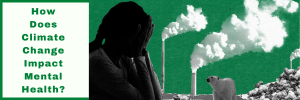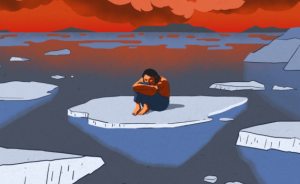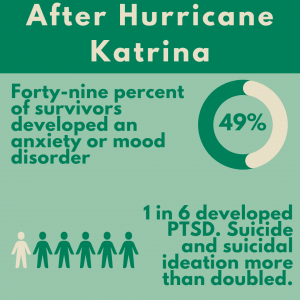

The increasing anxiety surrounding climate change has led to the creation of a new term: eco-anxiety. The American Psychiatric Association (APA) describes eco-anxiety as “a chronic fear of environmental doom.” Watching the slow and seemingly irrevocable impacts of climate change unfold, and worrying about the future for oneself, children, and later generations, can create feelings of stress, existential dread, hopelessness, and guilt. Eco-anxiety is not a diagnosable condition, however, it can exacerbate existing mental health issues. Eco-anxiety is a normal response to the threat of climate change and remember you are not alone!
Closely related to eco-anxiety are eco-grief and solastalgia.

Eco-grief is “grief felt in relation to experienced or anticipated ecological losses, including the loss of species, ecosystems, and meaningful landscapes.” Grief is a natural response to loss, but eco-grief is unique because climate change is an ongoing process that encompasses entire ecosystems. In addition, eco-grief is a disenfranchised grief, or grief that doesn’t have a core cultural support or social acknowledgement in the general public.
As climate change completely alters people’s lived landscapes, many are likely to experience grief over a place that is important to them—a phenomenon called solastalgia. This psychological phenomenon is characterized by a sense of desolation and loss similar to that experienced by people forced to migrate from their home environment.
Eco-anxiety, eco-grief, as well as the physical impacts of climate change such as disasters and the loss of property can lead to

- PTSD and trauma: Disasters that cause personal injury, injury or death of a loved one, and damage to or loss of personal property have a high potential for immediate and severe psychological trauma. Initial symptoms of terror, anger, and shock often diminish over time, but many people will experience chronic post-traumatic stress disorder (PTSD).
- Clinical depression and anxiety disorders: Direct exposure to life threatening events as well as the feelings of helplessness and loss associated with eco-anxiety and grief can also lead to clinical depression and anxiety disorders.
- Stress: Climate change can be considered an additional source of stress to our everyday concerns. The stresses of climate change, both direct and indirect, add to an individual’s pre-existing ones, pushing them to their mental limit.
- Anger, violence, and substance abuse: PTSD, depression, anxiety, and compounded stress can lead to increases in high-risk coping behaviors, such as substance abuse and increased aggression and violence. These behavioral changes can put strain on interpersonal relationships, furthering feelings of isolation, especially if the friend or family member doesn’t hold the same views on climate change.